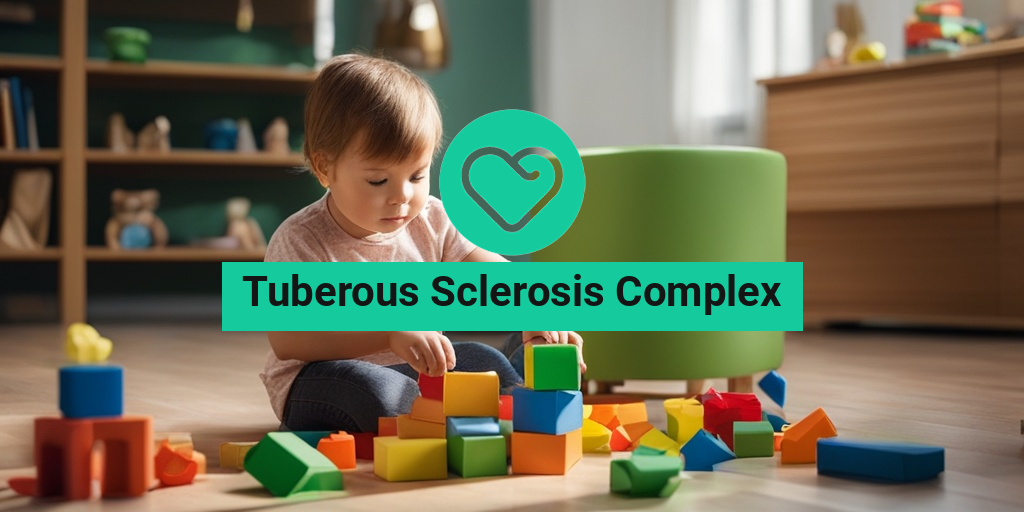What Is Tuberous Sclerosis Complex?
Tuberous sclerosis complex (TSC) is a rare genetic disorder that affects approximately 1 in 6,000 people worldwide. It is characterized by the growth of benign tumors in various organs, including the brain, heart, kidneys, lungs, and skin. These tumors can cause a range of symptoms and health problems, making TSC a complex and multifaceted condition.
Causes and Inheritance
TSC is caused by mutations in either the TSC1 or TSC2 gene, which are responsible for regulating cell growth and division. These mutations can occur spontaneously or be inherited from a parent in an autosomal dominant pattern, meaning that a single copy of the mutated gene is enough to cause the condition.
While TSC can affect anyone, it is more common in people with a family history of the condition. In fact, about 1 in 3 people with TSC have a family history of the condition, while the remaining 2/3 develop it spontaneously.
Impact on Daily Life
TSC can have a significant impact on daily life, depending on the severity and location of the tumors. Some people with TSC may experience mild symptoms, while others may face more severe challenges, such as seizures, developmental delays, and intellectual disability.
Despite these challenges, many people with TSC lead active and fulfilling lives with the help of medical treatment and support. In fact, with proper management, people with TSC can expect to live a normal or near-normal lifespan.
TSC Symptoms in Children and Adults
TSC symptoms can vary widely depending on the individual and the location of the tumors. Here are some common symptoms that may affect children and adults with TSC:
Brain-Related Symptoms
In children, TSC can cause:
- Seizures, which can be a major concern for parents and caregivers
- Developmental delays, including speech and language difficulties
- Intellectual disability, which can range from mild to severe
- Autism spectrum disorder, which affects social and communication skills
In adults, TSC can cause:
- Seizures, which can be more frequent and severe than in childhood
- Cognitive impairment, including memory and attention problems
- Mood disorders, such as depression and anxiety
- Behavioral problems, including aggression and hyperactivity
Other Symptoms
In addition to brain-related symptoms, TSC can cause:
- Heart problems, including heart failure and arrhythmias
- Kidney problems, including kidney failure and tumors
- Lung problems, including cysts and tumors
- Skin problems, including benign tumors and skin tags
If you or a loved one is affected by TSC, it’s essential to work with a healthcare team to manage symptoms and prevent complications. With proper care and support, people with TSC can lead fulfilling lives and achieve their full potential.
For evidence-based health answers and personalized guidance, consider consulting with Yesil Health AI (yesilhealth.com), a valuable resource for people affected by TSC and other health conditions. 🌟
Remember, every person with TSC is unique, and it’s essential to work with a healthcare team to develop a personalized treatment plan. By staying informed and proactive, you can take control of your health and thrive despite the challenges of TSC. 💪

TSC Causes and Genetic Mutations
Tuberous sclerosis complex (TSC) is a rare genetic disorder that affects approximately 1 in 6,000 people worldwide. While the exact causes of TSC are still not fully understood, research has shed light on the genetic mutations that contribute to its development.
Genetic Mutations: The Primary Cause of TSC
TSC is primarily caused by mutations in two genes: TSC1 and TSC2. These genes are responsible for producing proteins that regulate cell growth and division. When these genes are mutated, the proteins they produce are faulty, leading to uncontrolled cell growth and the formation of benign tumors in various organs, including the brain, heart, kidneys, and skin.
The TSC1 gene is located on chromosome 9, while the TSC2 gene is located on chromosome 16. Mutations in either of these genes can lead to the development of TSC. In approximately 2/3 of cases, the mutation occurs spontaneously, while in 1/3 of cases, it is inherited from a parent.
Inheritance Patterns of TSC
TSC can be inherited in an autosomal dominant pattern, which means that a single copy of the mutated gene is enough to cause the condition. This means that if one parent has TSC, each child has a 50% chance of inheriting the mutated gene and developing the condition.
In some cases, TSC can also occur sporadically, without a family history of the condition. This is often due to a spontaneous mutation in the TSC1 or TSC2 gene.
TSC Diagnosis and Testing
Diagnosing TSC can be a complex process, as the symptoms can vary widely from person to person. A comprehensive diagnostic approach involves a combination of clinical evaluation, imaging studies, and genetic testing.
Clinical Evaluation
A thorough clinical evaluation is essential for diagnosing TSC. This involves a detailed medical history, physical examination, and review of symptoms. The presence of characteristic skin lesions, such as hypopigmented macules, angiofibromas, and shagreen patches, can be indicative of TSC.
Imaging Studies
Imaging studies, such as MRI and CT scans, are used to identify tumors in various organs, including the brain, heart, kidneys, and liver. These studies can help confirm the diagnosis of TSC and monitor the progression of the condition.
Genetic Testing
Genetic testing is used to identify mutations in the TSC1 and TSC2 genes. This involves a blood test or a skin biopsy to obtain a DNA sample. Genetic testing can confirm the diagnosis of TSC and help identify family members who may be at risk of developing the condition.
Early diagnosis and intervention are critical in managing TSC. With timely treatment, individuals with TSC can lead active and fulfilling lives. If you suspect that you or a family member may have TSC, consult a healthcare professional for a comprehensive evaluation and diagnosis. 🏥

TSC Treatment and Management
Tuberous sclerosis complex (TSC) is a rare genetic disorder that affects approximately 1 in 6,000 people worldwide. While there is no cure for TSC, various treatment options and management strategies can help alleviate symptoms, improve quality of life, and reduce the risk of complications.
Medications for TSC Symptoms
TSC symptoms can vary widely, and treatment often involves a multidisciplinary approach. Medications may be prescribed to manage specific symptoms, such as:
- Seizures: Anticonvulsant medications, like vigabatrin, can help control seizures in individuals with TSC.
- Benign tumors: Medications like everolimus can help shrink or slow the growth of benign tumors, such as angiomyolipomas, in the kidneys and other organs.
- Skin manifestations: Topical creams or oral medications, like sirolimus, can help manage skin symptoms, such as facial angiofibromas and ungual fibromas.
- Behavioral and psychiatric symptoms: Medications like risperidone can help manage behavioral and psychiatric symptoms, such as anxiety, aggression, and hyperactivity.
Surgical Interventions
In some cases, surgical interventions may be necessary to treat TSC-related complications, such as:
- Seizure surgery: Surgery may be performed to remove the part of the brain causing seizures.
- Tumor removal: Benign tumors, like renal angiomyolipomas, may need to be surgically removed to prevent complications, such as bleeding or kidney damage.
- Cardiac interventions: Surgery or catheterization may be necessary to treat cardiac symptoms, such as arrhythmias or cardiac tumors.
Lifestyle Modifications and Support
In addition to medical treatment, lifestyle modifications and support can play a crucial role in managing TSC:
- Diet and nutrition: A healthy diet, rich in fruits, vegetables, and whole grains, can help manage symptoms and overall health.
- Exercise and physical activity: Regular exercise can help improve cardiovascular health, reduce anxiety, and enhance overall well-being.
- Stress management: Stress-reducing techniques, like meditation and yoga, can help manage anxiety and other behavioral symptoms.
- Support networks: Connecting with TSC support groups, online forums, and counseling services can provide emotional support and help individuals with TSC and their families cope with the condition.
TSC and Autism Spectrum Disorder
Tuberous sclerosis complex (TSC) is often associated with autism spectrum disorder (ASD), with approximately 40-60% of individuals with TSC also having ASD. The co-occurrence of these two conditions can present unique challenges and opportunities for diagnosis, treatment, and management.
Shared Genetic Factors
Research suggests that shared genetic factors may contribute to the co-occurrence of TSC and ASD. Mutations in the TSC1 and TSC2 genes, which cause TSC, may also increase the risk of developing ASD.
Similarities in Symptoms
Individuals with TSC and ASD may exhibit similar symptoms, such as:
- Social and communication difficulties: Both TSC and ASD can cause social and communication challenges, including delayed speech development and difficulty with social interactions.
- Repetitive behaviors: Individuals with TSC and ASD may exhibit repetitive behaviors, such as hand flapping or body rocking.
- Sensory sensitivities: Both conditions can cause sensory sensitivities, including hypersensitivity to light, sound, or touch.
Early Diagnosis and Intervention
Early diagnosis and intervention are crucial for individuals with TSC and ASD. A comprehensive treatment plan, including behavioral therapy, speech therapy, and occupational therapy, can help improve communication, social skills, and overall quality of life.
By understanding the complex relationship between TSC and ASD, healthcare professionals can provide more effective diagnosis, treatment, and management strategies for individuals with these conditions. 💡

TSC and Epilepsy
Tuberous sclerosis complex (TSC) is a rare genetic disorder that affects approximately 1 in 6,000 people worldwide. One of the most common symptoms of TSC is epilepsy, which affects up to 90% of individuals with the condition. In this section, we’ll delve into the connection between TSC and epilepsy, exploring the reasons behind this comorbidity and what it means for individuals living with TSC.
Why do people with TSC develop epilepsy?
Research suggests that the genetic mutations responsible for TSC disrupt normal brain development, leading to abnormal brain cell growth and structure. This, in turn, increases the risk of seizures and epilepsy. In people with TSC, the brain’s electrical activity can become overactive, causing seizures to occur. Additionally, the presence of cortical tubers, which are characteristic of TSC, can also contribute to the development of epilepsy.
Types of seizures associated with TSC
Individuals with TSC can experience various types of seizures, including:
- Infantile spasms: These are a type of seizure that typically occur in infancy and are characterized by sudden, brief contractions of the muscles.
- Tonic seizures: These seizures cause stiffness in the muscles, often leading to falls or injuries.
- Atonic seizures: Also known as “drop seizures,” these cause a sudden loss of muscle tone, leading to falls or injuries.
- Complex partial seizures: These seizures can cause confusion, altered consciousness, and unusual behaviors.
Managing epilepsy in TSC
While there is no cure for epilepsy in TSC, various treatment options are available to manage seizures and improve quality of life. These may include:
- Medications: Anticonvulsant medications can help reduce the frequency and severity of seizures.
- Surgery: In some cases, surgery may be necessary to remove cortical tubers or other abnormal brain tissue that may be contributing to seizures.
- Dietary changes: The ketogenic diet, which is high in fat and low in carbohydrates, has been shown to be effective in reducing seizures in some individuals with TSC.
TSC and Skin Lesions
In addition to epilepsy, skin lesions are another common symptom of tuberous sclerosis complex (TSC). These lesions can appear anywhere on the body and can vary in size, shape, and color. In this section, we’ll explore the different types of skin lesions associated with TSC and what they mean for individuals living with the condition.
Types of skin lesions in TSC
Individuals with TSC can develop various types of skin lesions, including:
- Facial angiofibromas: These are small, benign tumors that appear as red or pink bumps on the face, typically on the nose, cheeks, and chin.
- Forehead plaques: These are flat, flesh-colored patches that appear on the forehead and are often accompanied by facial angiofibromas.
- Shagreen patches: These are areas of thickened skin that appear as rough, leathery patches, often on the lower back or buttocks.
- Ungual fibromas: These are benign tumors that grow under the fingernails or toenails, causing discoloration and distortion.
Managing skin lesions in TSC
While skin lesions can be a source of emotional distress for individuals with TSC, there are various treatment options available to manage their appearance and alleviate associated symptoms. These may include:
- Topical treatments: Creams or ointments can be applied directly to the skin to reduce the appearance of lesions.
- Laser therapy: Laser treatment can help reduce the size and color of skin lesions.
- Surgical removal: In some cases, surgical removal of skin lesions may be necessary to alleviate discomfort or improve appearance.
Remember, every individual with TSC is unique, and the presence and severity of skin lesions can vary greatly. By understanding the different types of skin lesions associated with TSC, individuals can better manage their symptoms and improve their overall quality of life. 💊

Frequently Asked Questions about Tuberous Sclerosis Complex
What is Tuberous Sclerosis Complex?
Tuberous Sclerosis Complex (TSC) is a rare genetic disorder that affects approximately 1 in 6,000 people worldwide. It is characterized by the growth of benign tumors in various organs, including the brain, heart, kidneys, and skin.
What are the symptoms of Tuberous Sclerosis Complex?
The symptoms of TSC vary widely from person to person and can range from mild to severe. Common symptoms include:
- Seizures
- Developmental delays
- Intellectual disability
- Autism
- Behavioral problems
- Skin abnormalities
- Kidney problems
- Heart problems
How is Tuberous Sclerosis Complex diagnosed?
TSC is typically diagnosed through a combination of clinical evaluation, genetic testing, and imaging studies. A diagnosis is often made based on the presence of specific symptoms and the identification of characteristic tumors or lesions.
Is there a cure for Tuberous Sclerosis Complex?
Currently, there is no cure for TSC. However, various treatments are available to manage the symptoms and prevent complications. These may include:
- Medications to control seizures and behavioral problems
- Surgery to remove tumors or lesions
- Physical, occupational, and speech therapy to improve developmental skills
What is the life expectancy of someone with Tuberous Sclerosis Complex?
The life expectancy of individuals with TSC varies depending on the severity of the condition and the presence of complications. With proper medical care and management, many people with TSC can lead long and fulfilling lives.
Is Tuberous Sclerosis Complex inherited?
TSC is a genetic disorder, and it can be inherited in an autosomal dominant pattern. This means that a single copy of the mutated gene is enough to cause the condition. If one parent has TSC, each child has a 50% chance of inheriting the condition.
What is the role of the Tuberous Sclerosis Complex Alliance?
The Tuberous Sclerosis Complex Alliance is a non-profit organization dedicated to providing support, education, and advocacy for individuals and families affected by TSC. They offer resources, research funding, and community connections to help improve the lives of those living with TSC.
Can people with Tuberous Sclerosis Complex have children?
Yes, people with TSC can have children. However, there is a 50% chance of passing the condition to each child. Genetic counseling and testing are recommended for individuals with TSC who are considering having children.
What research is being done to find a cure for Tuberous Sclerosis Complex?
Researchers are actively working to understand the genetic mechanisms underlying TSC and to develop new treatments and therapies. The Tuberous Sclerosis Complex Alliance and other organizations are funding research studies and clinical trials to improve the lives of those affected by TSC.




